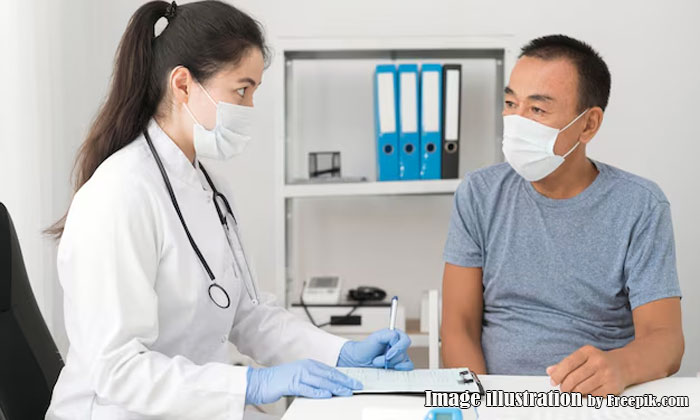
There are moments when our bodies send clear signals that something may be wrong, and recognizing these signs early can make a significant difference in preventing further complications. While minor health issues can often be managed at home, certain symptoms indicate the need for immediate medical attention. Knowing when to seek professional help can save lives and prevent serious health conditions from worsening.
Here’s a list of signs and symptoms that should prompt you to visit a doctor or go to the emergency room immediately.
1. Chest Pain or Discomfort
Chest pain is one of the most common and alarming symptoms that should never be ignored. Although it’s often associated with heart problems, it can also indicate issues with the lungs, digestive system, or even anxiety. If you experience:
- Pressure or tightness in the chest
- Pain radiating to the arm, jaw, neck, or back
- Shortness of breath, sweating, or dizziness
It could be a sign of a heart attack or other serious heart-related issues. Immediate medical attention is crucial in these situations, as quick treatment can be life-saving.
2. Sudden Severe Headache
Headaches are common, but a sudden, intense headache that feels like the “worst headache of your life” could be a sign of a stroke, brain aneurysm, or meningitis. Other warning signs to watch for include:
- Nausea or vomiting
- Vision changes
- Difficulty speaking or understanding speech
- Neck stiffness
If you experience a severe headache along with any of these symptoms, seek medical help immediately.
3. Sudden Vision Changes
Sudden changes in vision, such as partial or complete loss of vision, blurred vision, or seeing flashes of light, could indicate a serious issue like a stroke, retinal detachment, or glaucoma. If you notice:
- Blurry vision
- Sudden blindness in one or both eyes
- Flashes or floaters in your vision
It’s important to visit a doctor as soon as possible to address the potential underlying cause.
4. Difficulty Breathing or Shortness of Breath
If you suddenly find it hard to breathe or experience shortness of breath, it could indicate a respiratory emergency like an asthma attack, pulmonary embolism (a blood clot in the lungs), pneumonia, or heart failure. Symptoms that require immediate attention include:
- Difficulty speaking
- Fast, shallow breathing
- Bluish color to lips or face
- Wheezing or coughing up blood
Seek medical attention immediately, as shortness of breath can rapidly worsen and may be life-threatening.
5. Severe Abdominal Pain
While occasional stomach aches are common, severe and sudden abdominal pain could indicate a serious issue that requires urgent medical attention. Possible causes include appendicitis, gallstones, pancreatitis, or even an ectopic pregnancy. Warning signs include:
- Sharp or crampy pain that doesn’t go away
- Pain radiating to the back or shoulders
- Fever, nausea, or vomiting
- Blood in stool or vomit
If the pain is intense and sudden, it’s crucial to see a doctor without delay to rule out dangerous conditions.
6. Loss of Consciousness or Fainting
Fainting (syncope) can be caused by a variety of factors, from dehydration to more serious issues like arrhythmia (irregular heart rhythms) or severe blood loss. If you lose consciousness or feel like you’re about to pass out, it’s important to seek medical help immediately, especially if it’s the first time this has occurred or if you have additional symptoms such as:
- Dizziness or lightheadedness
- Chest pain
- Blurred vision or confusion
Fainting can be a symptom of a serious underlying condition, so it’s best to visit a doctor to get to the root of the problem.
7. Uncontrolled Bleeding
If you experience uncontrolled bleeding, whether from a cut, internal bleeding, or a nosebleed that won’t stop, it’s essential to seek medical attention. This could indicate an issue with blood clotting or an underlying condition such as a hemophilia disorder, or a trauma-related injury. Signs that need immediate attention include:
- Heavy bleeding that doesn’t stop after applying pressure
- Deep cuts or lacerations
- Bright red blood in vomit, stool, or urine
If you cannot stop the bleeding or if it’s accompanied by other symptoms, don’t wait to get medical help.
Also read other lifestyle articles on Destyless:
- The Role of Gut Health in Overall Well-being
- How to Maintain Mental Health in a Busy World
- Understanding and Managing Stress
8. Severe or Persistent Vomiting
While nausea and vomiting are common symptoms that can result from a variety of causes, severe or persistent vomiting can be dangerous and lead to dehydration or a more serious underlying issue. If you experience:
- Inability to keep fluids down
- Vomiting blood or material that looks like coffee grounds
- Severe abdominal pain with vomiting
It’s important to visit a doctor right away, as this could indicate an infection, gastrointestinal bleeding, or a blockage in the digestive system.
9. Sudden Weakness or Numbness
Sudden weakness, numbness, or paralysis in any part of your body — especially if it’s on one side of your body — is a potential sign of a stroke. Symptoms to look out for include:
- Facial drooping
- Arm or leg weakness
- Difficulty speaking or understanding speech
A stroke is a medical emergency, and the faster you get treatment, the better the outcome can be.
10. High Fever (Especially with Other Symptoms)
Fever alone is not always an emergency, but if you develop a high fever (above 103°F or 39.4°C), especially if it is accompanied by other concerning symptoms like:
- Severe headache
- Stiff neck
- Skin rash or bruising
- Persistent cough or difficulty breathing
It could indicate a serious infection, such as meningitis or sepsis, and you should seek immediate medical attention.
11. Severe Allergic Reaction (Anaphylaxis)
Anaphylaxis is a life-threatening allergic reaction that can occur rapidly after exposure to certain triggers, such as certain foods, insect stings, or medications. Symptoms include:
- Swelling of the face, throat, or tongue
- Difficulty breathing
- Hives, rash, or itching
- Dizziness or fainting
If you suspect anaphylaxis, use an epinephrine injector (if available) and seek emergency medical care immediately.
12. Severe Back Pain
While back pain is common, sudden and severe back pain could be a sign of a serious condition, such as a herniated disk, kidney infection, or an abdominal aortic aneurysm (a tear in a major blood vessel). Seek medical attention if the back pain is:
- Sudden and severe
- Accompanied by leg weakness or numbness
- Fever or weight loss
This could indicate a potentially serious issue that needs to be addressed immediately.
Conclusion
While many health issues can be managed at home or through routine visits to your healthcare provider, there are specific signs and symptoms that should prompt immediate medical attention. Chest pain, sudden vision changes, difficulty breathing, and severe headaches are just a few of the indicators that you should seek urgent care. When in doubt, it’s always better to err on the side of caution and seek help, as prompt medical attention can prevent more severe complications and even save lives. Your health is important, and knowing when to visit a doctor could be the key to maintaining your well-being.






